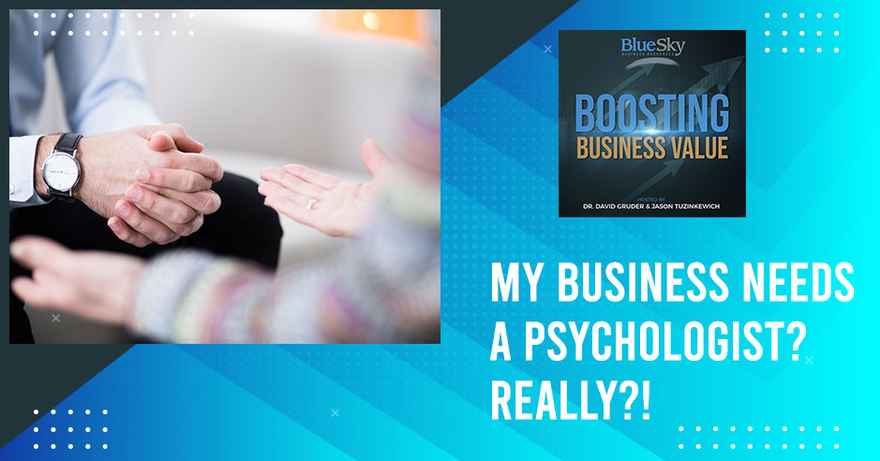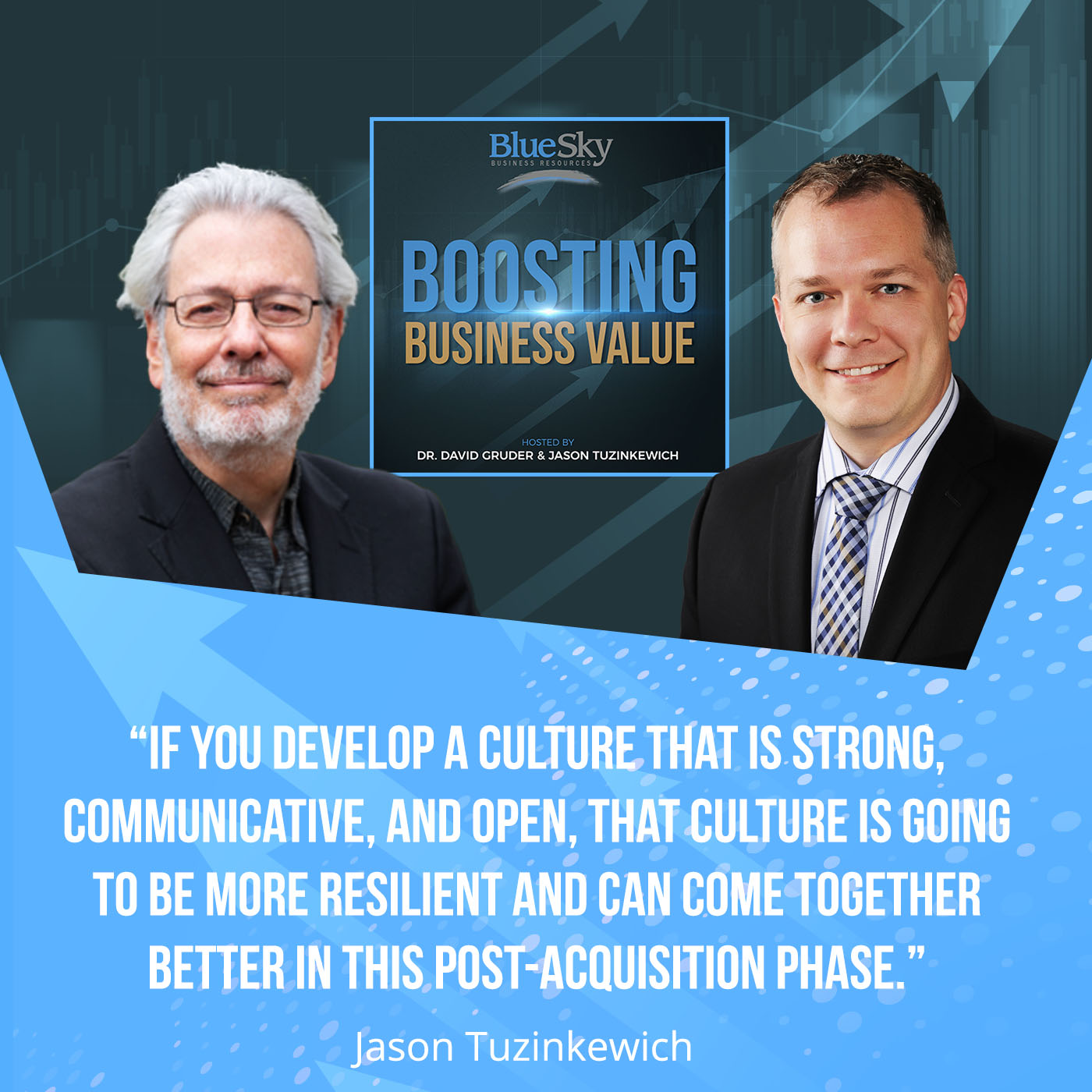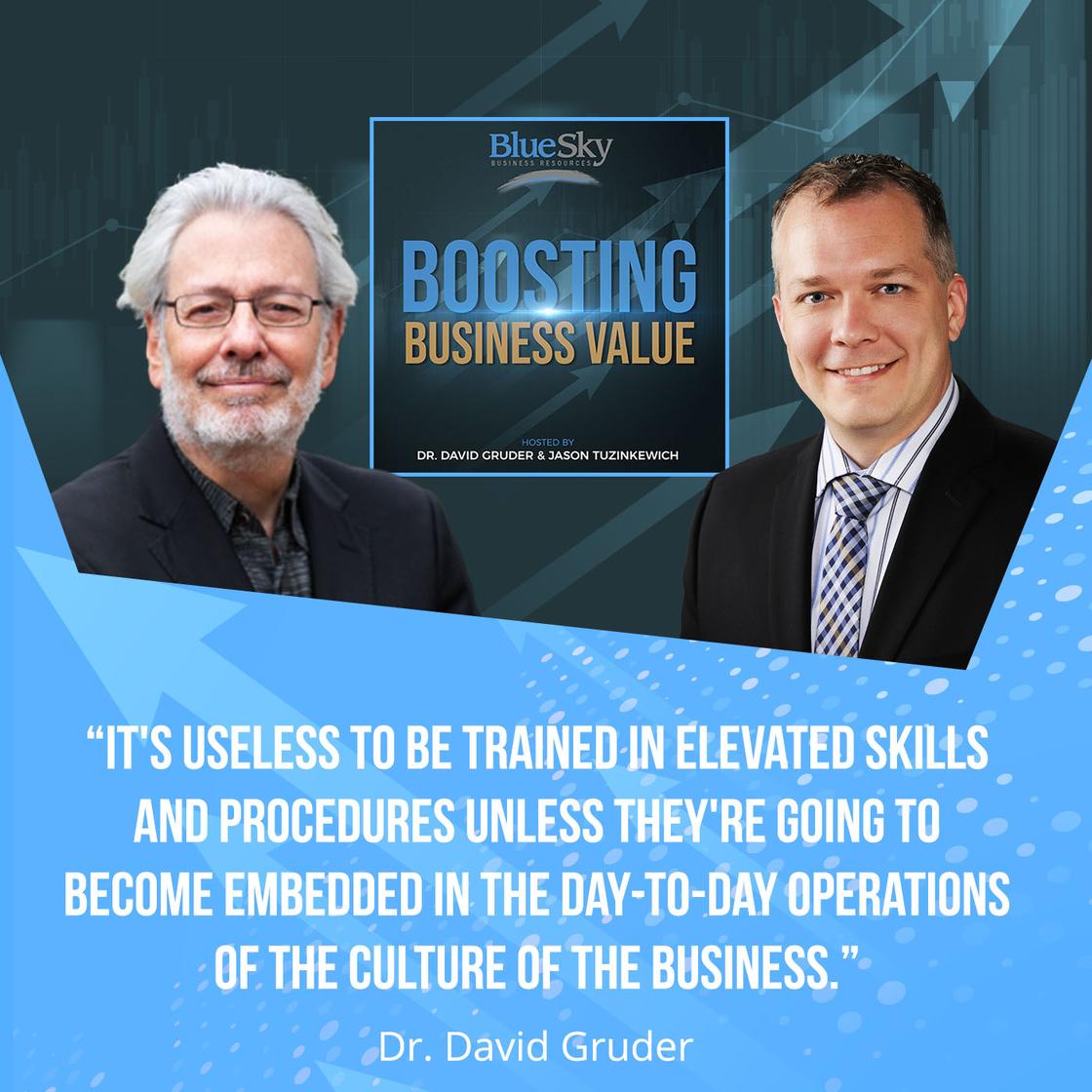Ep. 29 - My Business Needs A Psychologist? Really?!

Explore the widely underestimated value of a Business Lifecycle Organizational Development Psychologist, especially in the realms of elevating leader capacities, fostering superior company culture, enhancing customer experience, safeguarding brand integrity, and navigating the intricate exit process. Uncover the distinctive strategic guidance, tactical training, and procedures installation, which set these experts apart in their ability to propel businesses to remarkable success across multiple dimensions. Discover essential qualities and factors that are crucial for selecting the best psychologist for your specific needs. Don't miss this rare opportunity to gain clarity on the profound impacts a Business Lifecycle Organizational Development Psychologist can bring to your business, or to those you advise, fund, or help sell. Tune in to unlock these often overlooked secrets to lasting success.
---
Watch the episode here
Listen to the podcast here
My Business Needs A Psychologist? Really?!
Why You Need A Business Lifecycle Organizational Development Psychologist On Your Team... And How To Find The Perfect Fit
As you know, for those of you who have been reading for a while, at Boosting Business Value, we do not spend a lot of time talking about Blue Sky Business resources, who we are, and what we provide. We hope that the information that we provide is valuable enough that you'll want to get to know us on your own. However, we realize that as a service to our audience, it's appropriate that we point out that we're one of the very few, if not the only investment bank that has an organizational development psychologist on our team.
We think that it's very important that you understand why that is valuable to our firm but also to you as a business owner. For those of you who are new, I'm Jason Tuzinkewich. I'm the Chief Operations Officer for Blue Sky Business Resources. With me, as always, is my foil, my friend, and my partner in crime, Dr. David Gruder. He is Blue Sky's Business Lifecycle Exit Planning and Post-Acquisition Psychologist. David, take it away.
Thank you. As a footnote, this episode is valuable also for private equity firms and investment banks to know about. Why don't we jump straight into what the big challenges and solutions are related to the kinds of issues that virtually every business has that they don't usually realize an organizational development psychologist is their best solution to?
I appreciate you bringing that up. Let's start out with the hardest one. I'm guilty of this too. I think we all are. Leaders hate to admit that we have significant gaps in our leadership skills. As an executive team, our collaborative effectiveness could be enhanced by focusing on and raising awareness of the gaps that we have and allowing ourselves to learn and grow in communication as well as leadership skills. This will help us move to the next phase, especially going back to previous episodes of our meaningful inflection points, a better understanding of ourselves as leaders, how we behave, and how we act together as a team can accelerate those next-level transitions.
Connected with what you were saying is that leaders often also hate to admit that we haven't been sufficiently trained in dimensions of business that relate to the psychological aspects of effective business, including sequencing effectiveness. A lot of leaders are so much in the visionary mindset that they find it hard to shift into strategy, let alone into tactics. If they shift into tactics, the question of what to do in what order, that sequencing effectiveness, tends to be a missing skillset. It's not your fault if you don't know how to do that well. It's simply a skill that is undertrained.
We leaders often hate to admit that we haven't been sufficiently trained in the dimensions that relate to the effects of the psychological aspects of business.
To piggyback on that, in our experiential world as leaders, as we grow up through experience, but also if we go through an educational path, we learn a lot about tactics, metrics, and the hard elements of running a business. This idea of crafting and implementing a high-performance, high-collaboration, and high-happiness culture is pretty soft for an educational system. It's not usually something that we strive to go out and get educated on when we're busy with the hard and fast day-to-day of running a business.
We're undertrained and undereducated in a lot of these soft skills that make culture exceptional. It's largely by chance and by luck that we end up with some great leaders who have this innate ability. For the rest of us, getting help and getting training and coaching in this could be extremely valuable or as valuable as getting training and coaching on running the numbers.
This whole thing of soft skills, in businesses, there's often an acknowledgment of the importance of soft skills, especially these days. There's more awareness of that, but not a corresponding level of efficacy or effectiveness in translating those intentions into step-by-step procedures for implementation. That's where the value and the wisdom of an organizational development psychologist come in because the good ones know how to translate soft skills into hardcore procedures and implementation processes.
Along with that, another not fully connected dimension to this that's as important is that you and I most often see that business owners imagine that they're exit-ready before they and the business actually are exit-ready. A lot of that is because of not knowing how to run the numbers. That's for sure. Another part of that is not knowing how to assess the people pieces for exit readiness as well.
As an investment bank, we deal with M&A transactions. That's our bread and butter. Eighty-seven percent of M&A transactions that fail fails because of intentional or unintentional sabotage by the selling party. When you first think about selling your business, you think about a transaction. We sell stuff all the time. That's what we do. It's so easy, we'll just go sell something, but then you get into it and you start to realize that this is the most financially and psychologically fraught experience in a business founder's life. That can sneak up on a person if you're not preparing for it. That's when these transactions end up being sabotaged by an unemotionally prepared business founder.
The thing that I would add about that is virtually every M&A firm knows this, but very few have the expertise on board to do something about it on the psychological level of what creates these M&A dramas. There's post-exit. There are two aspects of post-exit, whether it's through succession or acquisition. One has to do with the owner having a next chapter in their life after exiting the business that they're on fire about living into. A lot of business owners don't have that, or they have it in mind in some vague and fuzzy intention-level way, but not in the brass tacks, “How am I going to implement it?” kind of way.
There's also, in post-exit, the issue of the new acquirer or the new CEO on how they are going to integrate into this company. How are they going to work with the existing personnel, the existing culture, and the things that made the company acquisition-worthy in the first place without tinkering with the company in ways that turn it into something that isn't as profitable as what they were buying because they're so intent on putting their own stamp on the company without the psychological savvy to determine what parts of the stamp they want to put on the company that’s going to help it elevate to the next level versus turn it into something different from what made it successful in the first place?
The other part of this is there are a whole lot of other people involved other than just the seller and the new CEO. This trickles through the entire company culture. One of those things is if you are one of those emotionally enlightened, high EQ leaders, and you develop a culture that is strong, communicative, and open, that culture is going to be more resilient and come together better in this post-acquisition phase. We'll be able to guide that new CEO into welcoming the opportunities to put an appropriate stamp on making the business better and more valuable. I love that point.

The last one, and I think this one's the big elephant in the room, is the double stigma. This is a double whammy for the ego. Not only are we saying business leaders and business owners you need to ask for help. A lot of business owners and leaders are starting to get to the point where they're getting comfortable with help, but it's still a stigmatized thing for leadership. When you add on top of that, you need to get help from a shrink.
There's so much stigma behind all of that that we'd all rather rub some dirt on it and walk it off. The more we can open ourselves up to the idea that talking to a psychologist doesn't mean you're crazy or weak. It actually means that you're strong enough to get the same type of training for these soft emotional skills as you would for the hard technical stuff. That's something that, as a society, we've made this a bad thing for no good reason.
My piggyback on that is that's related to a misnomer that a lot of people have. When they think about a psychologist, they only think about psychotherapy. Psychologists who are properly trained can do a whole lot more than psychotherapy. Just because a business needs an organizational development psychologist, that doesn't necessarily mean or it most often doesn't mean that psychotherapy is what's needed.
I'm glad you said that, but I still spend a lot of time on your couch. As we're digesting and mowing on these issues that’s our challenge to getting engaged with an organizational psychologist, what is it that we should be looking for?
That's absolutely where we need to go next. In unpacking what to look for, the first thing that is important for our audience to be aware of is that there's a kind of a bifurcation in my field in the first place where you have people who are trained to be psychotherapists and you have psychologists who are trained in organizational development or IO, Industrial Organizational psychology. Very few are trained in both clinical psychology and organizational development psychology.
The wisdom that clinical psychologists can offer is massive because they have a deep-dive understanding of psychological dynamics inside of individuals and between individuals. That's valuable. If they don't know how those principles impact a business and how to intervene in a non-psychotherapeutic way in a business to help the culture elevate itself and the leaders elevate themselves, then their clinical psychology wisdom is of very limited value.
On the other side of it, there are organizational development and IO psychologists who understand things about organizational dynamics and testing which is the IO, Industrial Organizational realm. However, they don't have a depth of clinical knowledge that can take into account those internal and interpersonal psychological dynamics. I was blessed with getting my Doctorate in both Clinical Psychology and Organizational Development Psychology.
For the first twenty years of my career, I was doing both. In the decades of my career, I stopped providing psychotherapy because the amount of time that I was out of town providing training, keynotes, and consulting made it impossible for me to be consistently available to psychotherapy clients. I'm still drawing from decades of wisdom and experience on top of my training in clinical psychology. The first part of what to look for is to look for a psychologist who's ambidextrous, who is equally endowed with clinical psychology wisdom and organizational development psychology wisdom.

If you can't find a Dr. David Gruder because you're one in a gazillion, is it reasonable to look for a well-balanced team, like one of each coming as a package deal?
It's reasonable to attempt to find that. The needle in that haystack is that if there is a team of both, they have to be exquisite in their collaboration with each other in order to be useful. On top of that, generally, the cost of having two psychologists is a little higher than the cost of having one.
Lucky for our audience, we've got you. Before we even get into this, I feel like there's this phase that preempts getting engaged with a psychologist, which is getting yourself and your team prepared for having this work done. You have to have an openness, a willingness, and an ability to be trained and educated in this way before you can sign up. Is that correct?
Not only is it correct, but it reminds me of one of my favorite light bulb jokes. How many psychologists does it take to change a light bulb?
Tell me, Doctor.
Only one, but the light bulb has to want to change. Your point about readiness is spot on. Also, in terms of what to look for, it's crucial to understand what your journey with a business lifecycle organizational development psychologist is going to look like. There are a number of components to that journey. The first of those components is inspiration and motivation, getting people excited about elevating their EQ, collaboration effectiveness, leader effectiveness, culture, next chapter plans if they're the owner, and things like that. It is getting them inspired and motivated.
The problem with that that so many businesses have run into, especially in prior decades, is that they would spend massive amounts of money to bring in an inspirational and motivational speaker. If they were fortunate enough to get a good one, then their team would respond to that speaker with a lot of motivation and inspiration that disappeared into the ethers within 48 hours. It didn't translate into changed behavior.
Unfortunately, a lot of businesses got sour on psychologists in business because they didn't realize that inspiration and motivation are only the first step in a multi-step journey. It's not sufficient by itself, even though it's got value. Once people are inspired and motivated, then comes appraisal, taking a look at what's working well and why it's working well. The even better ifs are, how things could work even better with leadership capabilities and culture functioning, collaboration, problem-solving, and conflict resolution. The list goes on and on in terms of appraisal.
From there, based on the appraisal, you get a business lifecycle phase-matched strategy. What I mean by phase-matched is that the ways in which a psychologist can be useful to a business, those ways are different depending on which phase a business is in. If we go back to the three inflection points, the way a psychologist can be helpful during the innovation phase is different than during the fruition phase, which is different during the bifurcation phase. If you have a business psychologist on board who doesn't understand what is the most useful thing to focus on, given the stage that the business is at in its development, their wisdom is not going to be as useful as it ought to be and it can be.
That's at the strategic level after appraisal. After that comes a tactical plan. Once you're clear about the strategy that's phase matched to where the business is and its lifecycle, then you have some decisions to make around tactics that are going to implement the strategy. In order to implement those tactics, there are often skills upgrades and/or procedure upgrades that need to be installed. Skills and procedures development comes after tactical planning. After skills and procedures development comes consistent masterful utilization of those skills and procedures.
Here's another trap that's common these days. A lot of businesses have gotten over the inspiration-motivation trap. They'll bring in someone to give their team training in new skills and new procedures. If that psychologist is good at that and that's where it stops, that money gets wasted, too, because it's useless to be trained in elevated skills and procedures unless they're going to become embedded in the day-to-day operations of the culture and of the business. Consistent masterful utilization of those skills and procedures that the team receives training in comes next.

Ultimately, when you have an effective process along the lines of what I've been describing, you would want, in your business, an internal expert designated, someone in the business who's trained in being able to continue the continuous improvement, the kaizen of the psychological dimensions of business success after that external psychologist consultant has finished doing their magic.
There are so many good points in there, but the two that come up to me most are the drum that I'm always beating, which is you see all these dramatic makeover shows and everybody thinks that you can have a makeover and be changed. If the underlying behaviors aren't worked on as well, you're going to backslide. It's inevitable. I love this practice-based approach to helping people elevate their culture through behavior. That's great. When he brought up the motivational speakers, I got to thinking about Chris Farley. I miss that guy.
Me too. In his van down by the river.
That's the one.
Some of you may not remember that classic earlier years, Saturday Night Live skit.
It's worth a YouTube.
For sure. Anything else you want to say about what we've been discussing before we get into key takeaways?
No, you've covered it so eloquently.
Why don't you take it away with some of the key takeaways for you?
The first one is the big one. Get over these stigmas. Asking for help and talking to a psychologist is valuable in a way that you're not going to get anywhere else. This isn't the type of stuff that you can stumble into unless you're somebody with an unnaturally high emotional intelligence, to begin with. The other thing is to spread the word and share the awareness. These business lifecycle and organizational psychologists do exist. You're not a unicorn. You're rare, but not a unicorn. You exist for a reason.
The biggest three underutilized reasons that I got out of this that are rare but worth sourcing out is that there is this stigma, so people aren't looking for you in the way that they should or engaging in the way that would be valuable. Few businesses and executives appreciate this soft side of how it can elevate everything that you do. I see some companies coming around to this. I see companies starting to realize that if you focus on the people, your bottom line improves better than if you focus on the bottom line. It's still rare. It's still unique. This is the type of thing that is powerful and why we wanted to make this show in the first place.
This ties in with the takeaway that I want to most emphasize, which is related to how painful it is for me to see businesses, their leadership, and their culture suffer because they don't have access to professionals like me. They know that there are psychological dimensions to be addressed. They know that soft skills are important, but they don't know who to look to turn those soft skills into hardcore training, procedures, and implementation. It's a suffering and pain in a business that is avoidable and needless, except for the fact that what you were saying about stigma and also about not knowing the wealth and the range of contribution and helpfulness that a psychologist who's equally endowed on the clinical end and the organizational development end of psychology can bring to a business's success.
The final takeaway for me is about overcoming the stigmas. As I said earlier, the starting place for overcoming those stigmas is to stop thinking of psychology as only psychotherapy. It is not only psychotherapy, and it has so much more beyond psychotherapy to offer to businesses, governments, international relations, and all levels of society and humanity beyond psychotherapy. It's a crime that competent psychologists aren't being used far more extensively in business and governance.

It's true. You might have a branding problem there.
Should we devote a future episode to that? For sure, that's true. Any final comments before we wrap this up?
I'm good, thank you.
On behalf of you, Jason Tuzinkewich, and myself, we thank you once again for reading this particular episode. We want to once again remind you to click the subscribe button so you can be notified immediately when we release future episodes. Lastly, we want to invite you to take advantage of Blue Sky's free surveys for gauging your business health more accurately. These are incredibly potent surveys, each of which takes only a few minutes to complete, yet even though they're not time-consuming to complete, what you get as part of completing the survey at no cost is real-time feedback and recommendations.
In my opinion, it would be foolhardy to not invest that small amount of time in order to get that massive value. Don't be deceived by the fact that these are free, because frankly, other firms will charge and do charge big bucks for some of these kinds of assessments. Blue Sky makes those available at no charge. In order to get started with those, go to BlueSkyAdvisors.net.


0 comments
Leave a comment
Please log in or register to post a comment